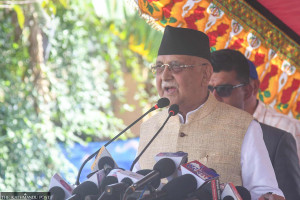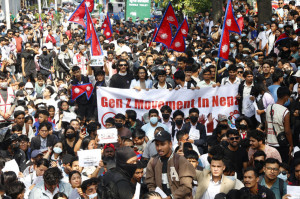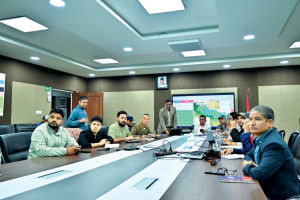Entertainment
Before the hunt
Job-hunting can at first seem like a dizzying prospect, especially if you are just entering the market as a young professional.
Pareshwor Kharel
Job-hunting can at first seem like a dizzying prospect, especially if you are just entering the market as a young professional. The competition can seem overwhelming, and the choices available and uncertainty can be daunting. But steer clear of common misapprehensions—finding the right job does not necessarily have to be such a stressful endeavour. With strategic planning, vision, and attention to detail, you can plan your career moves well in advance to prepare yourself for your ideal job and remain on top of your professional game. Whether it is an internship that you are looking for, a part-time job or a temporary position, any time is the right time to start planning your career! To help you navigate the professional world of job-hunting with ease and confidence so you can land yourself your dream job, here is a list of key resources to assist your search.
Know yourself
How well do you really know yourself? Besides your favourite movies and how you like your tea, have you taken some time to ask yourself who you are and who you would like to be? It is pivotal that you reflect on yourself continuously not just for professional advantage but also for persistent self-growth. Make it a habit to constantly evaluate yourself, your strengths, weaknesses, desires, ambitions and expectations. How do you visualise your ideal career?
How do you see yourself ten years from now? What sets successful professionals apart from everybody else is a set of concrete goals against a realistic timeline, as well as a careful evaluation of their top skills and shortcomings.
Network
The power and importance of networking cannot be stressed enough in today’s day and age. Networking is a long-term end game; you need to network every day—with every conversation. People are more likely to work with individuals they know or people who come with high recommendations; this is especially true for a working culture like Nepal’s.
Let friends, family, classmates and professional contacts know that you’re looking for a job, and don’t be afraid to ask for their help in finding connections. Be sure to use social networking tools, like LinkedIn and Facebook—these will only help your increase your circle, which will in turn rope in more opportunities. You can also increase your network through careers fairs, alumni events and conferences, and the many meet-ups that take place on a regular basis.
Polish
Your CV and your performance at the job interview are of the umpteenth importance during your job hunt. Make sure you use all the tools available to polish both.
When it comes to your resume, make sure that it is well-constructed and professional. Your CV will be the first layer of filter prospective employers will use to weed out the weaker candidates—you don’t want to just make up the numbers. Keep in mind that CVs are best when they are short and concise. Employers don’t want to read a novel when they have hundreds of other applications to sift through. There are several tools online that will help you format and realign your CV to ensure that yours stands out from the rest.
After having made it past the first filter, your job interview is probably what will play the most important role in whether you are hired or not. Practice is the key to be successful in the interview. Do practise by answering questions and think about your experience, skills and goals because it will allow you ready yourself for the interview. You can even find a career counsellor or online tools like Big Interview, to help you prepare for the interview and sit through mock sessions. During an interview, you are trying to not just show that you are competent to fill the position that is vacant but also your personality and ability to work in a team. Make sure that you hit all the notes right on both accounts.
Zero in
Always remain on the lookout for new opportunities (even when you are already at a job!) This way you always have a clear idea of the next step you will be taking. When settling down to focus on your job hunt, it is important that you begin to zero in on a couple of organisations that would fit your ‘dream job’ category and a handful of others as your back up. There are two things to remain mindful of. First, you need to stay open to opportunities in both small and large organisations. Bigger is not always better, especially in today’s world where small start-ups and ventures are amply proving that success need not always be defined by the size of the building you are working in.
Secondly, don’t only look for jobs in your immediate vicinity; find organisations in cities you would love to relocate to! The modern connected world has made it very convenient to network with professionals not just in your localised context but from around the world. Use it! Once you have done so, it is important to remember that your tailor your cover letter or/and your resume for the exact position and company you are applying to. You don’t want to send out the same material to ten different companies, you are only hobbling your own chances that way.
Develop a support system
The job search process can be a draining experience. It is rare that a young professional is able to find his or her dream job at the first go. Add the unreasonable amount of expectations heaped on them, and the job hunt can prove to be a frustrating transition. Which is why it is important to find people in your life—close friends, family, mentors—who can keep you motivated during the process. Because transitions between jobs can drag on for extended periods of time, it is important that you stay motivated, focused and hopeful. The support systems you build around you will play a big role in insuring that.
Be flexible and adaptable
It is easy to get into a one-track mind-set when you are on the hunt for jobs. As the workplace gets more and more specialised today, it is easy for professionals to find themselves put into smaller and smaller boxes.
But we humans are not one dimensional beings; we have multiple talents and a varied range of interests. The same is true for a job hunt: the truth is, you might need to think outside the box and remain open towards opportunities that might be outside of you comfort zone or specialisation. Be flexible and adaptable during your search, particularly with opportunities that see your interests overlap.
Kharel is the managing director at Kantipurjob.com




 22.12°C Kathmandu
22.12°C Kathmandu










